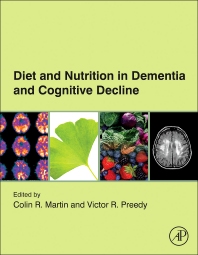This is a comprehensive publication which has dual aims of looking at the role of nutrition in the development of various forms of dementia, and how nutrition is affected as dementia progresses. It also includes practical strategies to manage the various challenges.
Before addressing the question of nutrition, a detailed introduction describes the range of dementing disorders, including conditions not always placed under the dementia ‘umbrella’, such as Motor Neurone Disease and Normal Pressure Hydrocephalus. The diagnosis and management of these conditions may be a useful reference, particularly for non-Neurologists, and especially for the rarer conditions such as Pick’s Disease.
The literature base is fully sourced and referenced consistently in every section, and authored by experts in that field. This reassures the reader that a balanced argument is given for the data presented. There is the additional advantage that this book is extremely up to date and therefore includes the most recent and topical of trends or innovations in diet, such as the ‘Paleo’ diet and the use of the over the counter nutritional supplement ‘Souvenaid®’.
This is a reference book which is likely to be helpful to ‘dip in and out of’ according to your clinical speciality, and the patients you see. For clinicians specialising in Neurology and Palliative Medicine it can provide a useful guide to provide objective answers to questions patients may bring to clinic. Such questions may seem trivial, such as ‘I have heard I should take a Magnesium supplement/eat oranges etc. etc. to slow the rate of my dementia progressing – what do you think Doctor/Nurse/Dietitian?’, but will be important to the patient and should be addressed. This book allows, at a moment’s glance over the wide-ranging content and index, a review of the literature and the practical advice required.
Over the last few decades, there has been intense focus on primary prevention of cardiovascular disease. Many of the elements of a cardio-protective diet may also be protective in cognitive conditions, especially vascular dementia. However, as we look to prevent cognitive disorders, this book serves to also remind clinicians of the role of diet, as well as other risk factors. Its wider readership might include those working in Health Promotion and Public Health. And it is probably accessible enough that relatives of those affected by the conditions described might use it to pick up information about lifestyle adjustments that they might consider.
ACNR 2015;15(2):22. Online 2/07/15
